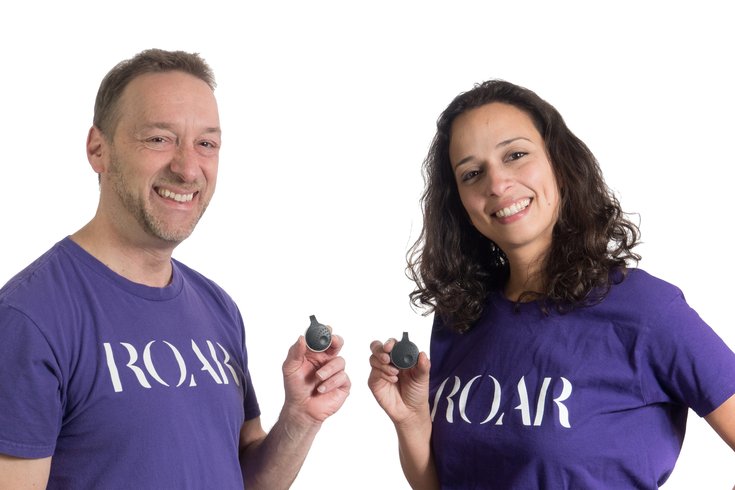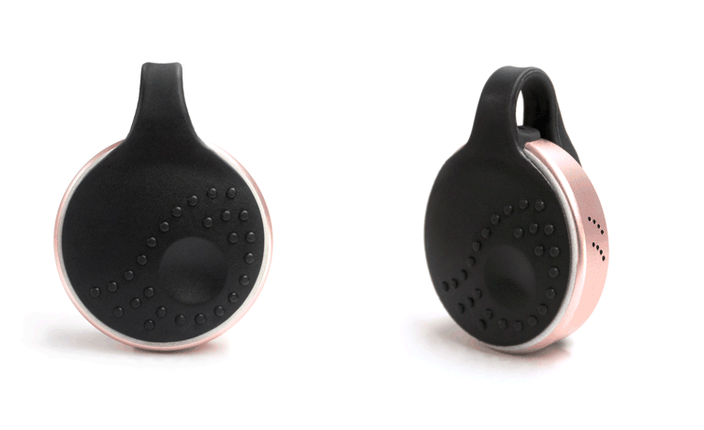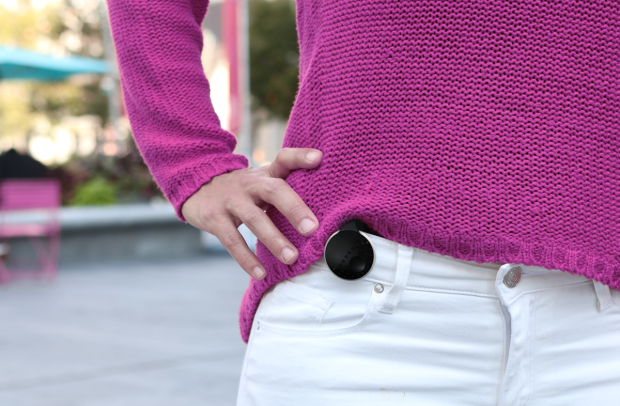
May 03, 2017
 Source/ROAR For Good
Source/ROAR For Good
ROAR for Good co-founders Anthony Gold, left, and Yasmine Mustafa display their product, Athena, a wearable self-defense technology.
Yasmine Mustafa traveled to South America several years ago looking to find the rest and travel opportunities that she had lacked since emigrating to the United States as a child.
The trip turned out to be far more transformative.
Mustafa gained a perspective that birthed ROAR for Good, a startup company she co-founded in hopes of reducing violence against women. The Philadelphia-based company has developed a wearable self-defense technology, dubbed Athena.
As Mustafa backpacked alone across six South American countries, she not only made efforts to immerse herself in the local cultures, but to get to know other travelers. Many of the women she befriended told her of their violent experiences — muggings, rapes and sexual assaults.
"It was just relentless," Mustafa said. "It really opened my eyes to the fact of violence against women. I didn't realize how bad it really was. I know that part of it was being by myself, traveling as a woman."
If the stories Mustafa heard while traveling weren't enough to prompt her to act, the brutal rape of a neighbor in Philadelphia served as a figurative "light bulb," Mustafa said.
Now, an Indegogo crowdfunding campaign has raised more than $300,000 to develop Athena self-defense technology. FLEX, the wearable technology manufacturer that produces FitBit, is manufacturing it.
And Mustafa and ROAR for Good co-founder Anthony Gold are being honored as regional finalists for the Ernst and Young Entrepreneur of the Year award.
"Philadelphia sees itself as a hub for social entrepreneurship," said Corinne Good, the award program co-director for the Greater Philadelphia region. "This year's finalists have passion for solving important issues while building a business that sustains their mission. Anthony and Yasmine are great examples of entrepreneurs who are doing just that."
Mustafa came to the United States as an eight-year-old refugee from Kuwait during the Gulf War, having been pulled from a bomb shelter by members of the U.S. Embassy looking for her American-born brother.
Her parents ran a 7-Eleven, where Mustafa stocked shelves as a teenager. But as she reached adulthood, Mustafa learned she was an undocumented immigrant. She worked a pair of under-the-table jobs while attending Temple University part-time. After seven-and-a-half years, she graduated with a business degree.
She then launched the startup 123LinkIt, a blog advertising company, but sold it late in 2011 — just before she became a U.S. citizen. By then, she was ready for an extended period of travel.
But in South America, Mustafa found her next calling as numerous women opened up about the violence they had suffered.
"Some, it was a random attack," Mustafa said. "The very first school that I went to — the day that I started — another student had been raped the night before at a party .... Other travelers I met talked about a neighbor or an uncle. It was varied and all over the place."
As Mustafa and Gold considered a product that would aid women, they initially envisioned a device that would allow women to wear mace on their bodies. But women had a terrible reaction to that idea, they said.
"We want to be able to get Athena into the lives of so many people that can make a difference." – Anthony Gold, co-founder of ROAR for Good
"Most women were afraid that they were going to use their self-defense tool against themselves — or they would be overpowered and it would be used against them," Mustafa said.
Athena — named after the Greek goddess — allows users to quickly sound an alarm or discreetly alert family and friends that they are in danger.
Other forms of self-defense, like mace, require people to dig through their pockets or bags — all while being attacked. Designed as jewelry, Athena easily clips onto a bag, necklace or belt. It allows users to quickly sound an alarm or discreetly alert family and friends that they are in danger.
Pressing and holding the device will sound a 90-decibel alarm — similar to a fire alarm — designed to simultaneously scare off a predator and alert the attention of anyone nearby. Eventually, it may enable users to contact 911.
ROAR for Good's “Athena” safety charm.
But Athena also allows friends and family to track the user.
Users can alert pre-selected friends and family when they are walking alone at night, going for a run or passing through an unfamiliar area. By double-tapping the device, users can let family and friends know they are safe.
A triple-tap alerts the user's contacts that they are feeling unsafe or threatened, sending a text message containing the user's location. Family and friends can then track the user's location until they verify they have reached a safe location.
"We want to be able to get Athena into the lives of so many people that can make a difference," Gold said. "Adding 911 capabilities is something that's right on our radar screen, to get that done. It adds a great feature to what we're doing."
But ROAR for Good recognizes that wearable technology alone cannot eliminate violence toward women. As a B company, it invests 10 percent of its proceeds into nonprofits that provide empathy training to young men and boys.
"To make a real difference, you have to go to the root of the problem," Mustafa said. "When we dug into the reasons behind assaults and attacks against women, we found one of the causes was a lack of empathy."
ROAR for Good began shipping Athena wearables last month to customers who had pre-ordered the product.
They are being sold on the company's website for $99 apiece, or four for $357. Eventually, Gold said, ROAR for Good intends to make the products available at retail stores and on college campuses.

 ROAR for Good/for PhillyVoice
ROAR for Good/for PhillyVoice